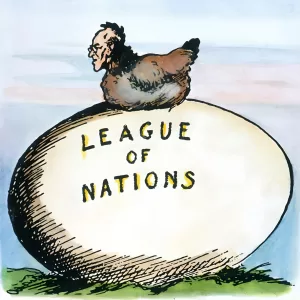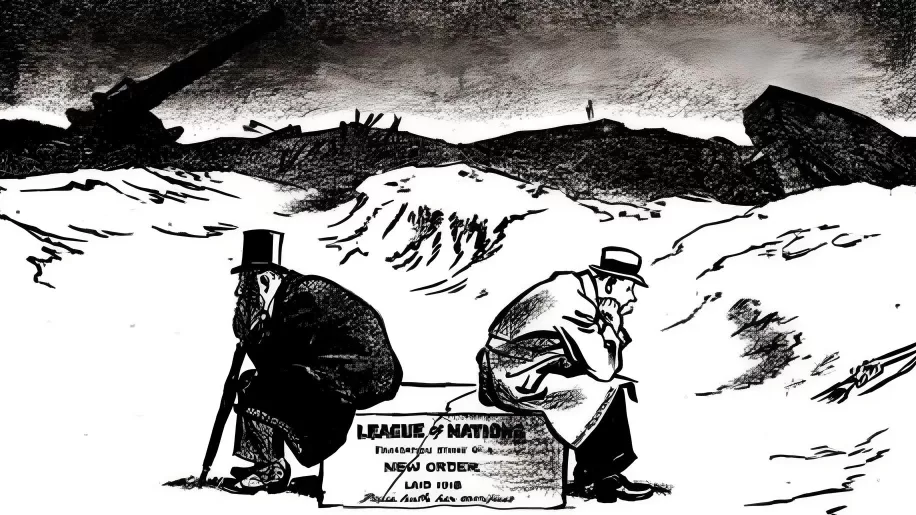Endless is the credulity of the human mind. Having just passed through a period of indescribable devastation caused by the rapacity and treachery of an unwisely trusted nation which caught civilisation unarmed and unawares, the world purposes once more to adopt a policy of sweet trustfulness, and to place its faith again in those imposing ‘scraps of paper’ known as treaties and covenants; this time setting up as its bulwark against barbaric inroads a prettily and abstractly conceived ‘parliament of man and federation of the world’ popularly and semi-officially labelled as “The League of Nations.” It is to be a very nice and attractive League, we are told; brimful of safeguards against ordinary war, even though somewhat deficient in safeguards against Bolshevism. War, in fact, is to be formally and distinctly prohibited, or at least discouraged; which is of course an absolute guarantee of an immediate millennium of universal peace! Ultimately, as the grave proponents of the scheme condescend to inform us, all nations are to be included in this Utopian circle of friendship and confidence; thus giving us the valued collaboration of our highly honourable German, Turkish, and Bulgarian brothers in the momentous task of governing the future earthwide Elysium. Verily, it is a pleasing vision.
But visions generally become dangerous when mistaken for practical possibilities, and the present case is not likely to prove an exception. Since a war-weary and mentally fatigued world is really listening soberly to the vague theorising of league-advocates, it behooves us to awake to full consciousness and examine this roseate rhetoric in the white light of reason, history, and science. To sign any hastily drawn and clumsily patched league covenant without such an examination would be contrary to the traditions of a free and enlightened people.
Is it indeed true that man has suddenly discovered an infallible panacea for all political ills? Is it indeed certain that a general entanglement of diverse and in many case opposed countries offers a solution of all national difficulties? Have we indeed exchanged the natural laws of mankind and this earth for those of fairyland? To all these queries The Conservative is inclined to venture a negative reply.
Warfare, whose minimising is the avowed object of the proposed league, is something which can never be abolished altogether. As the natural expression of such inherent human instincts as hate, greed, and combativeness, it must always be reckoned with in some degree. Men will submit to argument only up to a certain point, beyond which they invariably resort to force, however great the odds against them. Would the league reduce warfare? On the contrary, it would probably have a precisely opposite effect. By multiplying international contacts, it would multiply international animosities; and upon each outbreak of trouble the indirectly involved powers would be less likely to act constitutionally as suppressors, than to divide according to sympathy and previous alignment, and to participate as combatants. Oaths and treaties are worth no more than the honour of those who make them. Set up one league, and it will soon be undermined by a score of clandestine inner leagues.
What we need as an international safeguard is not a cumbrous and futile federation of miscellaneous nations good and bad, with the independence of each one virtually destroyed; but a simple and practical alliance betwixt those powers such as the United States, Great Britain, France, and Italy, which inherit in common the highest ideals, and which possess almost no conflicting interests. Those who hold up our Federal Union as an example of a “League” in working order would do well to mark the fact that the component states are all of one general type, and not in any way comparable to the widely diverse nations of the globe. Such an alliance, properly armed, would constitute an almost resistless and stable force in world-politics; affording the best defence possible for our civilisation, and providing the best possible guarantee against needless wars.
Let us cease to think in unrealities, or to mouth such benevolent but empty catchwords as “disarmanent” and “universal brotherhood.” We are living not in Paradise but on Earth ;and will fare best if we marshal the harmonious forces of civilisation in a sensible way for an attainable object, rather than rashly yoke together opposed and dissimilar cultures in the vain hope of realising a fantastic and impossible ideal.








